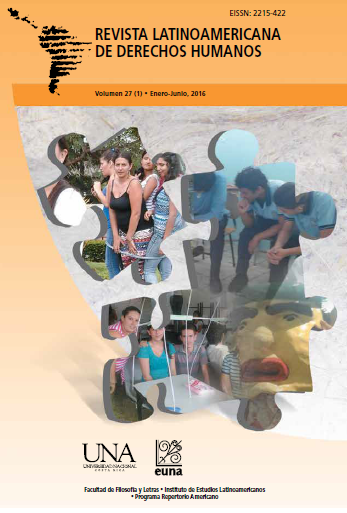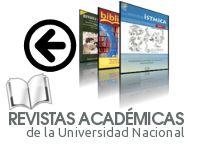Critical pedagogy as a means to develop the moral autonomy
DOI:
https://doi.org/10.15359/rldh.27-1.3Keywords:
Exercise of freedom, education of conscience, moral autonomy and critical pedagogy.Abstract
The main objective of this paper is to present contemporary studies and proposals on the emergence of moral conscience and the exercise of moral autonomy and analyze whether the educational approach of Paulo Freire favor or not the exercise of freedom and autonomy settings moral. To understand the development of moral autonomy is necessary to explain the principles of birth of the moral conscience of Jean Piaget, the processes of moral development of Lawrence Kohlberg and the communicative action and moral development from the perspective of Jürgen Habermas. Freire's critical pedagogy focuses on three areas: awareness of the subjects (reading of the world) against reality, the exercise of freedom from educational activities and the generation of critical thinking from the individual to the community, which involves understanding the story (personal and community) as a possibility and not as determination.
References
Dussel, E. (1998). Ética de la liberación. México: Editorial Trotta.
Freire, P. (1993). Pedagogía de la esperanza. Argentina: Siglo xxi editores, S.A.
Freire, P. (2003). El grito manso. Argentina: Siglo xxi editores, S.A.
Freire, P. (2006). Pedagogía de la Indignación. Segunda edición. España: Morata.
Freire, P. (2008). Pedagogía del oprimido. Quincuagésima quinta edición. México: Siglo xxi editores, S.A.
Freire, P. (2009). La educación como práctica de la libertad. Edición revisada. España: Siglo xxi editores, S.A.
Freire, P. (2010). Cartas a quien pretende enseñar. Segunda edición en español. Argentina: Siglo xxi editores, S.A.
Habermas, J. (1996). Conciencia moral y acción comunicativa. Barcelona: Ediciones Península.
Habermas, J. (2002). Teoría de la acción comunicativa II. Cuarta reimpresión. México: Taurus.
Habermas, J. (2008). Teoría de la acción comunicativa I. Cuarta reimpresión. México: Taurus.
Kohlberg, L. (1992). Psicología del desarrollo moral. Bilbao, España: Editorial Descleé de Brouwer.
Papalia, D. y Wendkos, S. (1988). Desarrollo humano. Segunda edición. México: McGraw-Hill.
Papalia, D. Duskin, R. y Martorell, G. (2012). Desarrollo humano. Duodécima edición. México: McGraw-Hill.
Piaget, J. (1981). Psicología y epistemología. Barcelona: Ariel.
Piaget, J. (1984). El criterio moral en el niño. Quinta edición. España: Ediciones Martínez Roca.
Selman, R. (1980). The Growth of Interpersonal Understanding. New York: Academic press.
Soto, J.A. y Bernardini, A. (2002). La educación actual en sus fuentes filosóficas.Segunda edición, varias reimpresiones. Costa Rica: EUNED.
Downloads
Published
How to Cite
Issue
Section
License
El material que se publica en esta Revista está bajo una licencia “Creative Commons” 3.0 Costa Rica (CC, Reconocimiento-NoComercial-SinObraDerivada 3.0 Costa Rica (CC BY-NC-ND 3.0 CR) . Esto significa que el material publicado en la revista se puede compartir (copiar y distribuir) en cualquier medio o formato considerando que se debe reconocer de forma adecuada la autoría del material y la fuente, no puede utilizarse con fines comerciales y no se aceptan las obras derivadas (remezclar, transformar o crear a partir del material).








